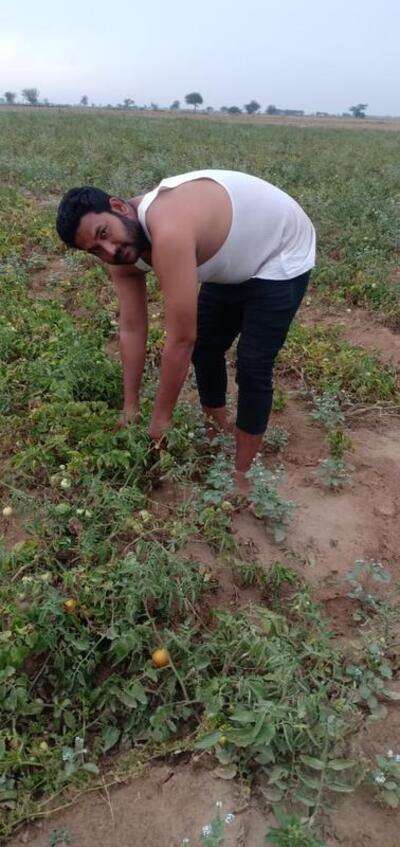
Nuh: Akhlaq, 27, of Dhada village in Nuh (formerly Mewat), has always earned a living driving trucks. But since April, he has had to pick up a new skill, farming, to feed his family of six that includes five children. He was taking a consignment of cosmetics from Chennai to Kathmandu, but after 48 hours of driving, he had to abandon the truck in Faridabad and return to his hometown on March 30 because of the lockdown.
At home, the situation was grim. “I could manage for around two weeks but after that, I had to look for work. After requesting a fellow villager Mohammed, I was allowed to help in his tomato farm for Rs 300 per day,” he said.
Akram Khan, 28, who finds himself in the same boat as Akhlaq, says he has been a driver for a decade and had never worked in a farm before. He found the work so difficult that initially, he wanted to quit even though he had exhausted the advance received from his employer. ‘But for the sake of my family, I am continuing and will have to keep at it to feed them,” he said.
Like these two men, hundreds of truck drivers in Nuh, which has roughly one lakh truckers, are forced to work as farm hands, helping in harvesting and storing crops, to earn their daily wage, as they are stuck in their hometowns without a salary due to the movement restrictions.
Thirty-year-old Khushed Ahmad of Karheda village, for example, says his employer has refused to transfer more money after the advance made to him, and even though border restrictions might be relaxed, it is impossible for him to reach the destination with the existing funds. He, too, was going to Nepal to deliver spare parts.
“Even after reaching Nepal, we have to wait for around 10 to 12 days at the border, and during this period, we have to manage our own expenses,” he explained.
Apart from the drivers, the lockdown has left every stratum of the logistics industry a little frayed. Daljeet Kumar, the owner of a transport company, said they are also reeling under financial burden.
“We had already paid drivers, we have to pay EMI for the trucks and also bear other expenses. In this situation, we are not in a position to shell out another penny, and if the consignment is not delivered, the client will not release the payment, creating a vicious circle of monetary strain,” he said.
Rajuddin Jung, a local social worker, said transport companies are impervious to the plight of the drivers and are pressuring them to deliver the consignment ever since inter-state movement was allowed. “We are trying to arrange food for them but till the time companies give more funds to the drivers, they will be forced to stay here and earn a livelihood,” he said.
National president of All India Truck Operator Welfare Association, Ashok Sharma told TOI that this crisis is plaguing every corner of the country.
“The Centre as well as state governments have completely failed to address the issues of transport companies and truck drivers. These people are more exposed than doctors and police but no support has been offered to them,” he said.
He claimed to have written to the Prime Minister and some chief ministers to look into the state of truck drivers but it has yielded no relief so far.
At home, the situation was grim. “I could manage for around two weeks but after that, I had to look for work. After requesting a fellow villager Mohammed, I was allowed to help in his tomato farm for Rs 300 per day,” he said.
Akram Khan, 28, who finds himself in the same boat as Akhlaq, says he has been a driver for a decade and had never worked in a farm before. He found the work so difficult that initially, he wanted to quit even though he had exhausted the advance received from his employer. ‘But for the sake of my family, I am continuing and will have to keep at it to feed them,” he said.
Like these two men, hundreds of truck drivers in Nuh, which has roughly one lakh truckers, are forced to work as farm hands, helping in harvesting and storing crops, to earn their daily wage, as they are stuck in their hometowns without a salary due to the movement restrictions.
Thirty-year-old Khushed Ahmad of Karheda village, for example, says his employer has refused to transfer more money after the advance made to him, and even though border restrictions might be relaxed, it is impossible for him to reach the destination with the existing funds. He, too, was going to Nepal to deliver spare parts.
“Even after reaching Nepal, we have to wait for around 10 to 12 days at the border, and during this period, we have to manage our own expenses,” he explained.
Apart from the drivers, the lockdown has left every stratum of the logistics industry a little frayed. Daljeet Kumar, the owner of a transport company, said they are also reeling under financial burden.
“We had already paid drivers, we have to pay EMI for the trucks and also bear other expenses. In this situation, we are not in a position to shell out another penny, and if the consignment is not delivered, the client will not release the payment, creating a vicious circle of monetary strain,” he said.
Rajuddin Jung, a local social worker, said transport companies are impervious to the plight of the drivers and are pressuring them to deliver the consignment ever since inter-state movement was allowed. “We are trying to arrange food for them but till the time companies give more funds to the drivers, they will be forced to stay here and earn a livelihood,” he said.
National president of All India Truck Operator Welfare Association, Ashok Sharma told TOI that this crisis is plaguing every corner of the country.
“The Centre as well as state governments have completely failed to address the issues of transport companies and truck drivers. These people are more exposed than doctors and police but no support has been offered to them,” he said.
He claimed to have written to the Prime Minister and some chief ministers to look into the state of truck drivers but it has yielded no relief so far.

Coronavirus outbreak
Trending Topics
LATEST VIDEOS
More from TOI
Navbharat Times
Featured Today in Travel
Quick Links
Kerala Coronavirus Helpline NumberHaryana Coronavirus Helpline NumberUP Coronavirus Helpline NumberBareilly NewsBhopal NewsCoronavirus in DelhiCoronavirus in HyderabadCoronavirus in IndiaCoronavirus symptomsCoronavirusRajasthan Coronavirus Helpline NumberAditya ThackerayShiv SenaFire in MumbaiAP Coronavirus Helpline NumberArvind KejriwalJammu Kashmir Coronavirus Helpline NumberSrinagar encounter
Get the app







